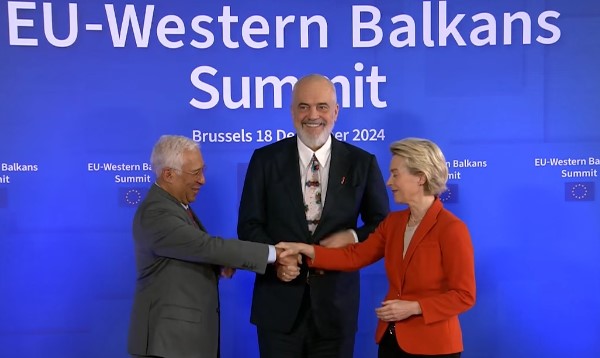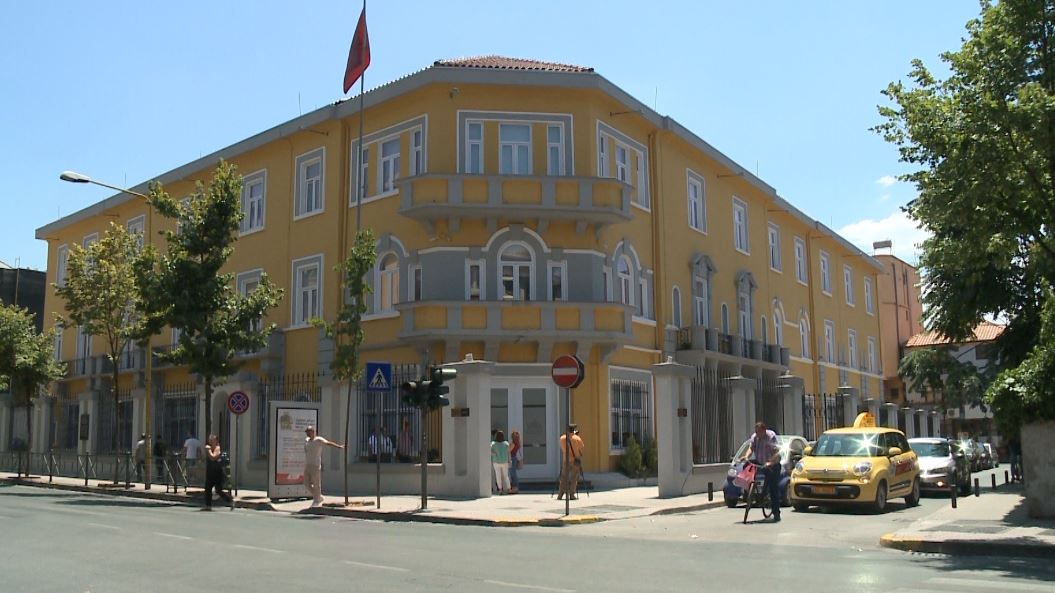Kosovo’s artists miss out on regional collaboration opportunities because of politics, lack of money, and sometimes unwillingness.
In 2023, for the first time in approximately 50 years, a play from Kosovo performed in the Montenegrin capital, Podgorica.
“I believe there is a lack of genuine desire to understand one another,” Adrian Morina, an actor from Kosovo, explained, referring to frequent cases of the biggest art festivals refusing to host plays from Kosovo.
While there is regular cooperation with Albania and North Macedonia, lack of vision and persistent political barriers have prevented Kosovar artists from presenting works in the other Balkan countries.
Morina told BIRN that “last year we had a tour with Multimedia Theatre (part of Kosovo based culture organisation Qendra Multimedia -Multimedia Center) only in Slovenia and Croatia,” assessing that cultural exchange in the Balkans has “paradoxically worsened in recent years.”
Dino Mustafic, a Bosnian theatre director, said that “the work of Kosovo’s theatres, the institutional and independent scene, does not lag behind in any regional quality parameter to be ignored.”
Cooperation with Bosnia and Herzegovina has also been affected by the visa regime. Logistical obstacles complicate the situation but Mustafic feels that the main issue is “mostly prejudice and political discrimination, which is a recurrence of relations from former Yugoslavia.”
He personally experienced hardship with the arrival of Kosovar theatre artists in Bosnia and Herzegovina during the period from 1997 to 2016 when he was the director of the Bosnian International theatre festival MESS. Mustafic said that “it had many obstacles, deliberately placed administratively and politically by the leadership of Republika Srpska to prevent the cultural exchange between Sarajevo and Pristina.”
The artificiality of such bureaucratic obstruction can be seen between Serbia and Kosovo.
Always “icy” in Serbia
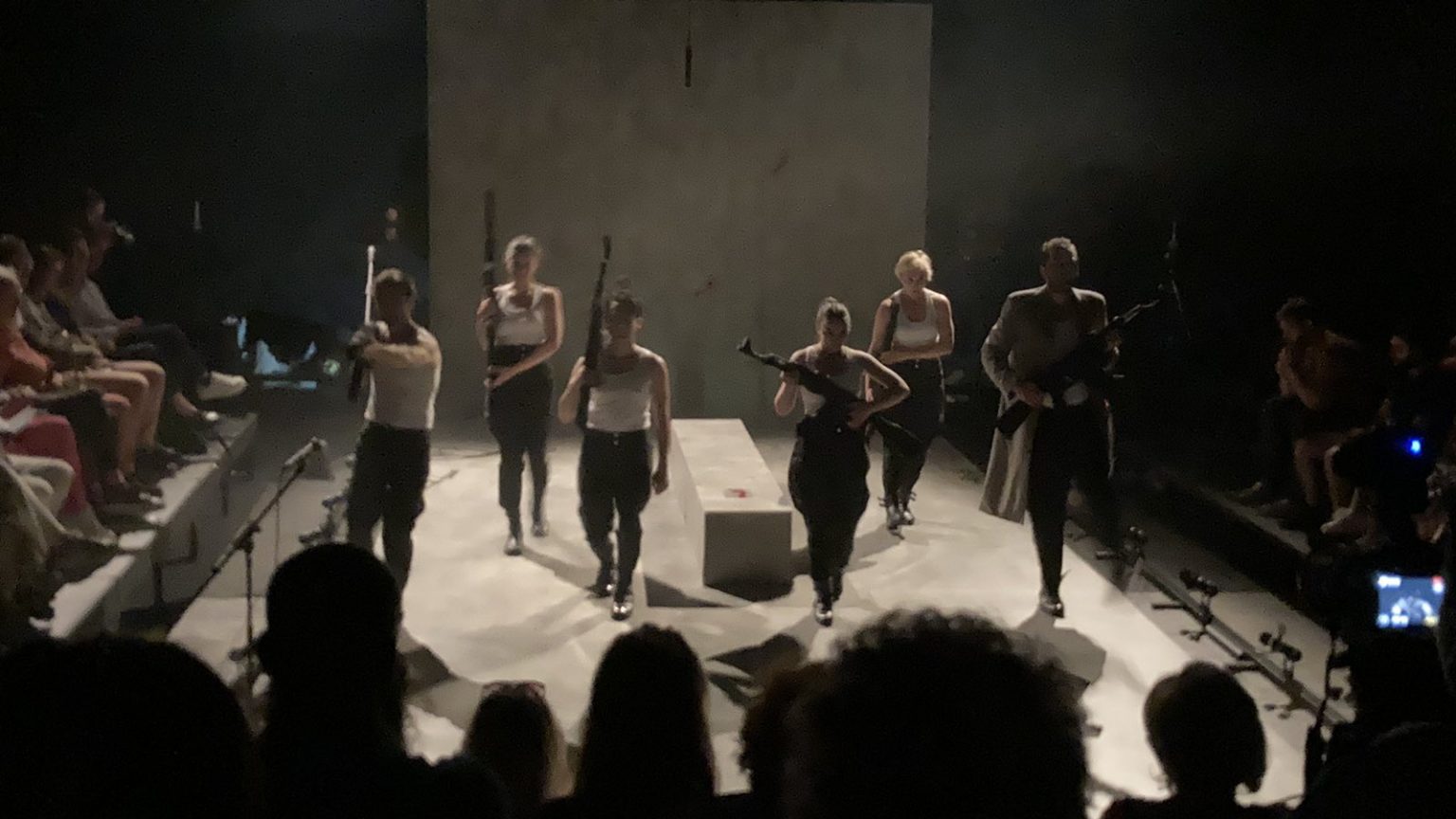
The Handke Project play at the Oda Theatre in Pristina on June 3, 2022. Photo: BIRN.
“There was a ‘blooming’ phase after the war, but things have changed for the worse,” Jeton Neziraj, a playwright from Kosovo and director of Multimedia Center said of Kosovo-Serbia relations, explaining that “the little progress that was made has almost returned to zero.”
According to him, the Sterijino Pozorje theatre festival in Novi Sad, Serbia, “has hesitated to invite any performances from Kosovo.” BITEF Festival in Serbia’s capital, Belgrade “never programmed a show from Kosovo,” although one of Neziraj’s plays, ‘Handke Project,’ was presented at the BITEF theatre outside of the festival.
Morina, who acted in the play, told BIRN that “the atmosphere was icy.”
“There wasn’t even a poster outside the theatre. It felt as if we were playing hide and seek—in silence, without any media coverage,” he recalled.
The highlight was the ban of the 11th edition of Miredita, Dobar Dan cultural peacebuilding festival in Belgrade, which started in 2014, aiming to present contemporary Kosovo Arts and Culture to the Serbian audience for strengthening the ties between Kosovo and Serbia.
Tanja Duknic, the festival’s coordinator from Youth Initiative for Human Rights in Belgrade, explained they dealt with public hate speech, death threats, and even a severed pig head sent to the Festival’s director, to be finalised with the protests on the very day of the festival.
“The artistic program was overshadowed by the politicisation of the festival itself,” Duknic said.
Although it was seen as a political decision, Morina pointed out that “those politicians are still elected” by majority rule.
“I’m sorry that young people don’t have the opportunity to get to know their neighbours,” Duknic said. “When we talk about Kosovo here in Serbia, it is as if we are talking about some aliens.”
“We are deprived of the opportunity to experience the people of Kosovo as people,” she concluded.
Neziraj’s play was supposed to open the programme of Miredita, Dobar Dan.
“Among the actors of the play, which calls for peace, co-existence, and reconciliation, they now see ‘Albanian thugs,’ violent people who have their hands washed with the blood of innocent Serbs in Kosovo,” Neziraj explained, adding that “anything that comes from Kosovo is seen with distrust.”
In the end, artists from Kosovo were ordered to leave Serbia as soon as possible. They were stopped on their way to Belgrade and escorted with police vehicles to Kosovo’s border crossing point.
“It was clear that, according to the state, Albanians are not welcome in Serbia,” Duknic said.
Artists left with responsibility to “foster relationships”
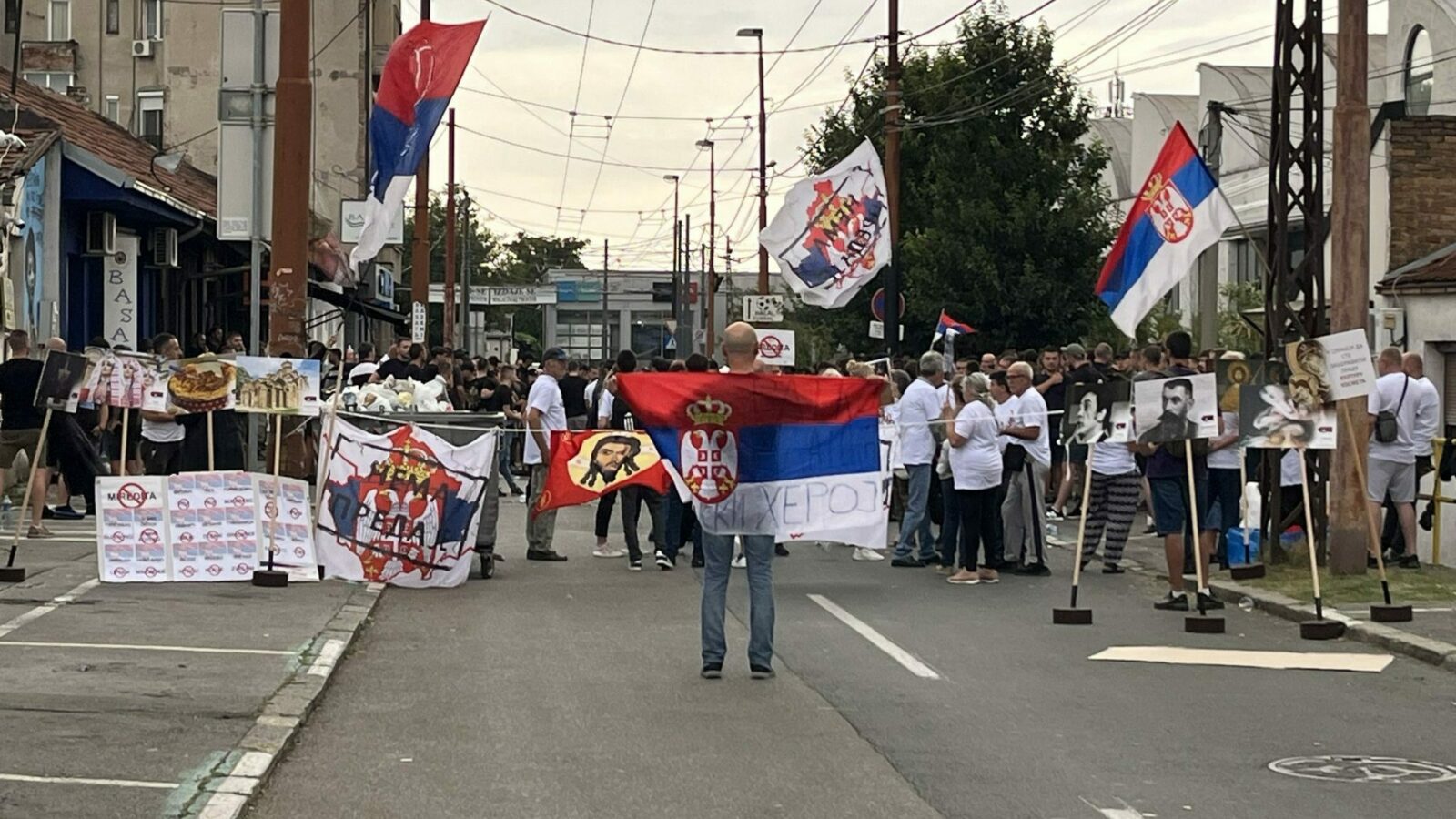
Right-wingers gathered in front of the venue where the ‘Miredita, Dobar Dan!’ festival was dur to open in Belgrade, June 27. Photo: BIRN/Katarina Baletic
The collaboration is often coming from artists themselves and civil society activities, even when lacking institutional support.
Kushtrim Mehmeti, art-director of Kosovar National theatre, said that “it is up to us (artists) to foster those relationships through consistent work and dedication,” since no external tensions should ever overcome the importance of arts.
“Politics can obstruct it, but it can’t shut it up or stop it,” Ejla Bavcic, a Bosnian actress, said. Bavcic was a part of few plays produced by Qendra Multimedia and felt nothing but a positive experience.
“They know exactly what they want to say and they say it without calculation or fear. The one who refuses ‘cultural exchange’ with them is at a loss,“ Bavčić concluded.
Unfortunately, some artists from Kosovo have experienced unwarranted backlash.
Kemil Bekteshi, a conceptual artist based in Sarajevo, who was born in Belgrade to parents from Kosovo, explained how “every presentation I make raises questions about my background.”
“I am very aware that these things are happening behind my back.”
His collaboration with Belgrade is frequent and mainly consists of working with the younger generation of curators and artists “whose views are very open and do not flirt with the right-wing politics of Serbia.”
Despite collaborating as an artist from Bosnia, he still has not presented at a state institution which, he acknowledged “may be a coincidence, but maybe, also, it is not.
According to Neziraj, the obstacles Kosovo artists face are political in their core because “independent Kosovo seems to hang over many people’s heads in Serbia, as if it was some devilish monster.”
A case of the 58th Salon of Belgrade Biennial in 2019 supports that claim. Next to every participant’s name was the country of origin with the only exception being the internationally known visual artist Petrit Halilaj from Kosovo.
Halilaj addressed the issue in an open letter after pulling out of the exhibition. At first, he
“saw it as an opportunity to create a bridge,” but after seeing that his nationality wasn’t recognized, he lost all hope.
“If artists are given a specific frame for their dreams, a frame that is outlined and monitored by the dominant power and politics, then how far can we go?” Halilaj asked.
Torn between politics and profit
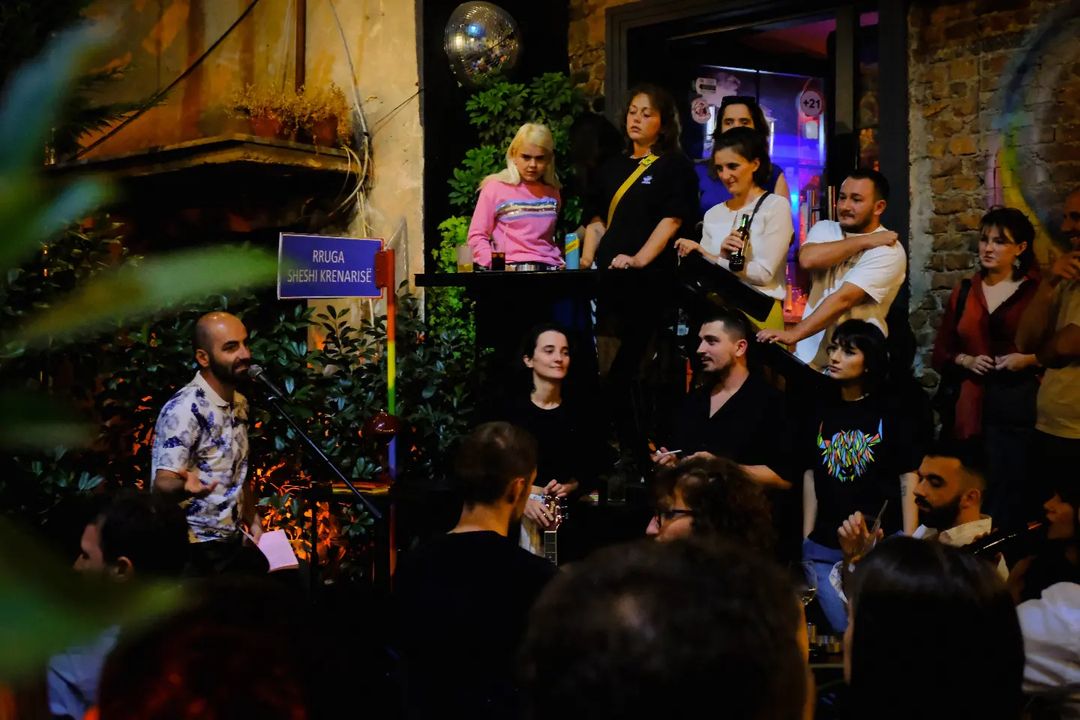
The presentation of the only collection of stories and poetries by queer writers from Kosovo and North Macedonia, in Albanian and Macedonian, in Prishtina. Photo: Courtesy of Sekhmet institute/Zana Begolli
The lack of representation of Kosovo artists is evident not only in visual arts but also in literature.
Shkumbin Gashi, a writer of Kosovo origin currently living in Switzerland, argues that nationality in the Balkans is “the elephant in the room.”
“Art is a form of politics,” he told BIRN. “If you go, for instance, to Serbia and you make a theatre play about the sexual abuse in the wars of former Yugoslavia, most likely you’re going to experience some barriers to get there.”
The state of literature in Kosovo is in a vicious circle. The absence of Kosovo origin writers in the dominant publishing houses of the region results in a lack of readership. Language barriers, economic difficulties, historical and political context, as well as “struggle for independence and recognition has often overshadowed cultural and artistic endeavours,” said Arber Selmani, a poet from Kosovo.
“Who is to say that Kosovo authors wouldn’t enjoy more acclaim and praise if they would actually have more chances of being translated to Balkan languages, European languages and even further, to world known languages and tapestries?” he questioned.
Gashi, whose award-winning book has been translated in English and German, admits he “was lost in how to communicate,” with potential publishers and readers because he cannot speak Serbo-Croatian, which is widely spoken in the region
“It seems like a faraway market, and the writers do not get instructions on how to proceed with such an environment. I think that responsibility also lies on Ministries and other relevant stakeholders to create bridges of connection,” Gashi explained.
Selmani has had “bits” of his work translated and presented in October 2024 as a part of the Revija Malih Književnosti (The review of small literature) regional literary festival in Zagreb, Croatia.
Selmani says that his case is more of an exception rather than the rule. Laguna, a publishing house in Serbia, and one of the largest in the Balkans, along with Buybook, the largest in BiH, confirmed that Kosovar writers are not present to a significant extent.
“The basic criteria we use when choosing a title is the quality of the literary or journalistic work and how many books correspond to our climate. Until now, we have not had concrete offers for the publication of books by Albanian writers,” Laguna told BIRN.
“We still haven’t found a way for cultural currents to overcome political barriers,” Buybook admitted, since they have not been able to host writers from Kosovo at their international literature festival Bookstan because of political tension and Bosnia’s visa regime.
After the Kosovo government’s decision to remove visas for BiH citizens starting from January 2025 the future looks brighter.
“We consider it a colossal change,” Buybook said. Buybook believes that “very soon funds/foundations will appear that could finance this mutual activity of translating and promoting literary works.”
“We have many publishers who would not be subject to political barriers,” Dunja Ilic, a literary critic based in Serbia, said. However, Ilic mentioned that “works that have little potential for sales are avoided.”
“This applies to all the literatures geographically close to us that are not in a language we understand—literatures in Macedonian, Bulgarian, Slovenian, Albanian, as well as Romanian and Hungarian,” Ilic explains.
In order to improve the position of Kosovo literature, the region has to “revive strong economic ties and the interests of business entities that will be able to produce surplus value,” Buybook said. Otherwise, “culture will not be a priority here, but more of a decoration.”
Meanwhile, Selmani urges his colleagues to take matters into their own hands.
“Start having your work translated without waiting for translators to knock on your door,” he said.
